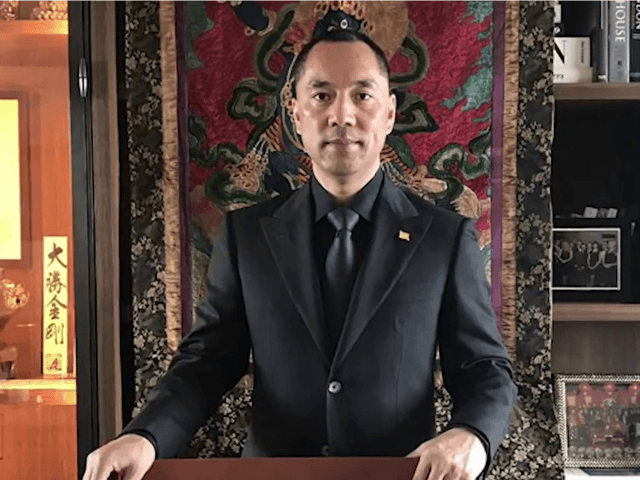The Hudson Institute, a Washington, DC, think tank, canceled a talk with Chinese whistle-blowing billionaire Guo Wengui this month after its website suffered a “Shanghai-based attack,” the Wall Street Journal reported on Monday.
The Journal had previously reported the attack, but on Monday noted that pressure from the Chinese government to silence Guo by any means necessary extended much further than targeting public speaking engagements, going as far as to use businessmen close to President Donald Trump to send a message requesting Guo’s deportation.
Guo, who was once close to many officials within the Chinese Communist Party, has since fled the country and requested political asylum in the United States. Guo has accused high-ranking communists of a wide variety of corrupt crimes through social media, particularly posts on Youtube and Twitter under the name Miles Kwok.
The Wall Street Journal notes that Guo was scheduled to speak at the Hudson Institute on October 4. Shortly after the event’s abrupt cancellation, the newspaper said that the Hudson Institute reported “a cyberattack on the Institute’s website originating from Shanghai, according to a Justice Department spokesman.” Chinese government representatives also attempted a more formal approach to persuade the group: calling the Institute from the Chinese embassy urging it to cancel the event because Guo “is a criminal and tells lies.”
Guo spoke instead at the National Press Club that week. “They are just a tiny group of Mafia, pure and simple,” Guo said at the event, referring to Xi Jinping’s closest associates, and urging lower-ranked Communist Party members to rebel against this “ruling clique.” He also argued that the United States should “take action” to limit the influence of Xi’s regime.
Guo remains in the United States, living in exile in New York and using social media to spread his message that the Chinese Communist Party is rotten to its core under “core leader” Xi Jinping.
On social media, Guo has targeted individuals within the Communist Party leadership with specific accusations—most vocally Wang Qishan, the head of Xi’s anti-corruption purge within the party. Guo claims Wang and his family have made millions through illicit deals with HNA, one of the largest corporations in China, and have secretly invested in U.S. real estate. HNA has sued Guo for defamation, while the Chinese government does not appear to have taken any steps to investigate Guo’s claims.
Reports on Guo’s allegations are quick to note that many of his claims are unsubstantiated—he has not produced documentation or other verifiable evidence for them.
Wang stepped down from the powerful Communist Party Politburo Standing Committee on Tuesday, however, after months of speculation, with little fanfare. Reports suggest the Chinese government has decided to let him go because he has reached the informal retirement age of 68.
At press time, the Hudson Institute’s website stated that the event with Guo has been “postponed,” not canceled, suggesting a possibility it may yet occur.
The Wall Street Journal notes that Guo’s case has since led to disarray at the highest levels of government, where President Donald Trump, the newspaper claims, referred to a “Chinese criminal” requiring deportation and clarified that he meant Guo by showing aides a letter from casino magnate Steve Wynn urging Guo’s removal from the country. The incident allegedly triggered a firestorm among Trump’s aides.

COMMENTS
Please let us know if you're having issues with commenting.